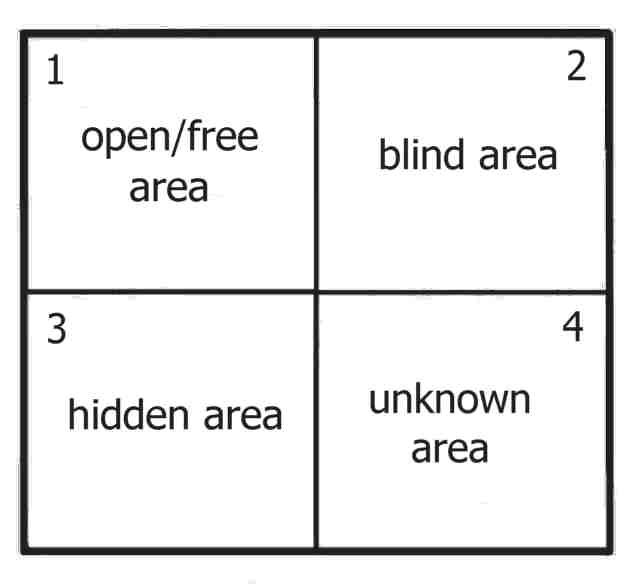Group dynamics and the Johari Window
I feel kind of weird posting this, because the people in this scenario could read this, but I feel like it’s really important to share this thing I figured out. Sorry if this is weird for any of y’all (and I’ll take it down if you let me know).
It involves a really fun psychological model called the Johari Window.

This defines our relationships to other people, in terms of content. We share some things with others openly (1), others know things about us we don’t (2), we have our deepest darkest secrets (3), and some things we haven’t figured out (and no one else has either…4).
Today, I had a group member on a development project almost break down. She has had trouble getting the project set up using my other group member’s install script. I didn’t get a chance to sit down with her and work this out until today, but we worked out part of the problem (a MySQL username thing). The second issue had to do with a specific problem made by the install script when ran on her particular machine, so I let the other group member work it out with her.
Except he didn’t! I have a huge problem with trying to code and working on intrapersonal stuff at the same time, so I wasn’t really paying attention, but I found out as she was leaving, he went back to code and left her with the thing still not working.
I was mad. Mostly mad at myself for not alleviating the problem and allowing her to leave probably unmotivated (I really need to get better at multi-tasking), but also mad at the script-writer for leaving her on her own without a working system (which she apparently hasn’t had the entire semester?! Why have I not noticed this…how has she written the code she has?!)
Anyways, I took most of this frustration out on the script-writer, who is quite the stress compounder. I’ve seen him get visibly anxious over more minor things than me telling him off for leaving her, so I was extremely scared about what my blow up was going to cause in the middle of causing it.
Ends up causing absolutely nothing. I’ve been walking around on egg-shells with the script-writer about things for a while, because of seeing him get really anxious about things in the past. I thought that would translate to him not being able to take conflict (and telling him that he messed up well). By letting the emotion overcome me, I ended up discovering a 3 (hidden area from the Johari Window, if you’re not paying attention), in that the script-writer can take on his interactions with others criticism without any visible anxiety.
Don’t get me wrong, this story is all about me failing, not the failures of others. I’ve obviously failed to be the reflective person concerned with people’s growth that I try to be, and I’ve also failed at being emotionally calm and collected when working in a professional setting. But I’ve also learned a bunch of extremely important things from this failure: I can’t code in a group meeting setting, even with time set aside for that, and especially not with this group. I really need to be on my top game as a facilitator and communicator, because there’s such a deficit of people thinking about interactions and problems that it’s going to cause any learning experiences for my fellow group members (and myself) to come to a halt. And I can stop trying to be accommodating with the script-writer, because he can take–and might actually work well with–a little conflict.
Really what it comes down to is that when working in a group, tears and yelling and failure and stress and all sorts of other negative things can be good…they Are really all just forms of passion. And all of these things, when looked at through a reflective lens (with the help of something like the Johari Window) can be extracted into something that you can call up in the future to make things work better.
Thanks for reading all this,
John
PS: I don’t think I mentioned it, but it’s important…this is the best group I’ve ever worked with. There is no apathy, which is so refreshing.